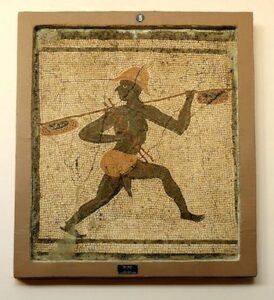
Roman Africans
*Roman Africans are affirmed on this date in 800 BCE. The Roman Africans or African Romans were the ancient populations of Roman North Africa that had a Romanized culture, some of whom spoke a variety of Latin.
They existed from the Roman conquest until their language gradually faded after the Arab conquest of North Africa in the Early Middle Ages (approximately the 8th Century A.D.). Roman Africans lived in all the coastal cities of Tunisia, Western Libya, Eastern Algeria, West Algeria, and Northern Morocco, though in a more limited fashion, mainly concentrated in the coastal areas and large towns. The area between East Algeria and Western Libya became known under Arab rule as Iraqiya, an Arabized version of the name of the Roman province of Africa.
Many Roman Africans were generally local Berbers or Punics, but also the descendants of the populations from Rome and Roman Italy or the Empire's diverse regions as legionaries and senators. Characteristics The Roman-Africans first adopted the Roman pantheon under the rule of the Roman Republic and were one of the first provinces to convert to Christianity. Among their best-known figures were Saint Felicita, Saint Perpetua, Saint Cyprian, and Saint Augustine, who mainly inhabited the westernmost part of Northwest Africa and were barely Romanized; Roman Africans (like Septimus Severus had Latin names in addition to speaking Latin.
The African province was among the wealthiest regions in the Empire, and therefore, people from all over the Empire migrated into the province. Many Roman Army veterans settled in Northwest Africa on farming plots promised for their military service. The Roman military presence in Northwest Africa was relatively small because of the province's safety; the Romans did not require a significant military presence in North Africa since it was not a target for external attacks or rebellions. When the need arose, the region's proximity to Italia made it easy to dispatch armies from Italia to North Africa. By the second Century A.D., the Fossa Regia province of North Africa had a population of three-fourths Italic, was fully Latinized, and embraced the Hellenic Religion. The North African garrison consisted of about 28,000 troops and auxiliaries in Numidia.
Starting in the 2nd Century A.D., these garrisons were primarily composed of local inhabitants. A sizable Latin-speaking population developed from a multinational background, sharing the northwest African region with those speaking Punic and Berber languages. Imperial security forces began from the local population, including the Berbers. By the end of the Western Roman Empire, nearly all the African provinces were fully Romanized, according to Theodor Mommsen in his The Provinces of the Roman Empire. Roman Africans enjoyed a high level of prosperity.
The Roman African populations kept their Latin language, as well as their Nicene-Chalcedonian Christian religion, under the Germanic Vandal occupation, the Byzantine restoration, and the Islamic conquest, where they progressively converted to Islam until the near-extinction of Christianity in the Maghreb in the 12th Century under the Almohads. The African Romance Latin dialect constituted a significant substratum of the modern Berber languages and Maghrebi Arabic varieties.
After their conquest, the Muslim conquerors distinguished three distinct categories of population in Northwest Africa: the foreign population from Rūm ((Eastern) Roman Empire); the Afāriqah: the Roman Africans, the native Latin-speaking community in the urban areas; and the Barbar, the Berber farmers that populated most of the rural countryside. This date was chosen because Britannica cited it as the date Rome was discovered in 56 A.D.